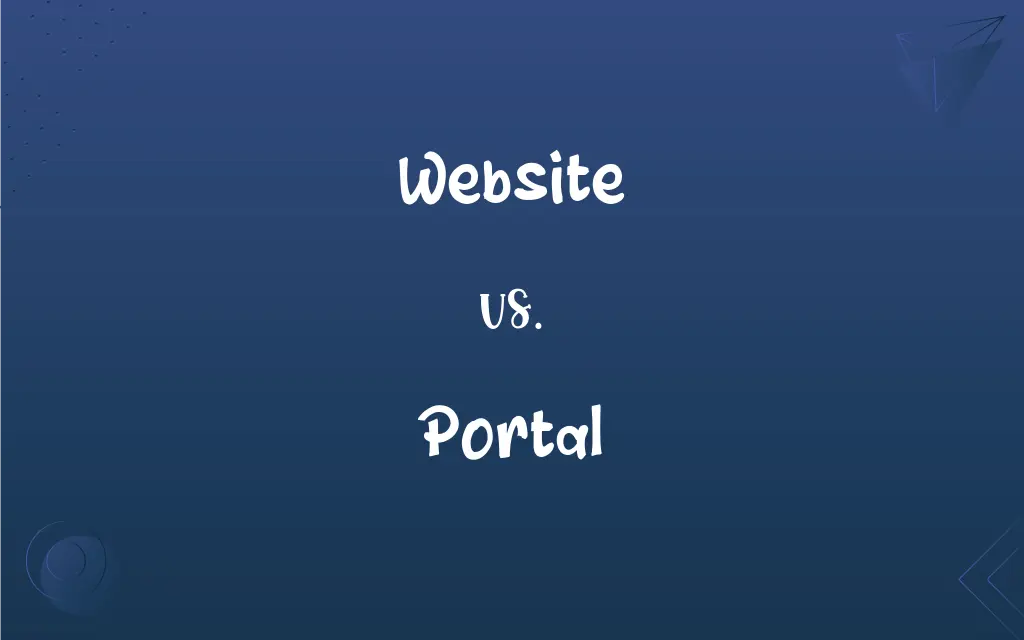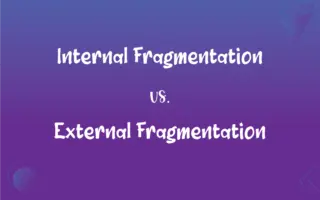Website vs. Portal: What's the Difference?
Edited by Aimie Carlson || By Harlon Moss || Updated on October 13, 2023
A website is a set of interconnected web pages on the internet, while a portal is a website that offers users a single point of access to various resources.

Key Differences
Both website and portal are platforms accessed via the internet, but they serve different primary purposes. A website is a digital space that provides information, showcases products, or offers services, whereas a portal acts as a gateway, offering users access to multiple resources from a single interface.
A website is typically designed to be publicly accessible to any user browsing the internet. Its primary goal is to convey information or to represent an individual, organization, or business. On the other hand, a portal often requires user authentication, ensuring a more personalized experience, such as providing individual account details, customized content, or access to specific resources.
The architecture of a website focuses on its design, layout, and the user journey through its content. It aims to be user-friendly, with navigation tailored to the site's purpose, whether that's informational, e-commerce, or entertainment. In contrast, a portal is structured to integrate various applications, services, and links, centralizing them into one location for the user's convenience.
Interactivity varies between websites and portals. While many websites offer interactive elements like contact forms, comment sections, or shopping carts, portals elevate this interactivity by offering personalized services, such as email access, profile management, or data retrieval from integrated databases.
In essence, while all portals can be considered websites due to their presence on the web, not all websites qualify as portals. A website presents data and may facilitate specific actions, but a portal acts as a centralized hub, integrating various resources and providing streamlined access to them.
ADVERTISEMENT
Comparison Chart
Primary Purpose
Provides information, showcases products/services
Offers a single point of access to multiple resources
Accessibility
Publicly accessible to any internet user
Often requires user authentication
Structure
Focuses on design, layout, user journey
Integrates various applications, services, and links
Interactivity Level
May offer contact forms, comment sections, etc.
Provides personalized services, profile management, etc.
Definition
A set of interconnected web pages
A gateway centralizing multiple web resources
ADVERTISEMENT
Website and Portal Definitions
Website
A digital location containing interconnected web pages.
I just launched my personal website to showcase my portfolio.
Portal
A centralized hub integrating multiple applications or services.
Through the employee portal, I can submit leave requests and view my benefits.
Website
A source of information, entertainment, or e-commerce on the internet.
She often reads book reviews on that website.
Portal
A website often requiring authentication for a personalized experience.
After logging into the portal, I saw my recent transactions.
Website
An online representation or storefront for brands or professionals.
After browsing their website, I decided to order the product.
Portal
A web-based interface combining diverse information and tools for users.
The health portal integrated appointment scheduling, medical records, and chat features.
Website
A platform representing an individual, organization, or business online.
The restaurant's website displayed their menu and reservation options.
Portal
A digital gateway offering access to various online resources.
The university's student portal allows access to class schedules and grades.
Website
A space on the World Wide Web defined by a specific domain.
The website's design was modern and user-friendly.
Portal
An online platform providing streamlined access to specific resources.
The city's portal offers various services, from tax payments to license renewals.
Website
A set of interconnected webpages, usually including a homepage, generally located on the same server, and prepared and maintained as a collection of information by a person, group, or organization.
Portal
A doorway, entrance, or gate, especially one that is large and imposing.
Website
(Internet) A collection of interlinked web pages on the World Wide Web that are typically accessible from the same base URL and reside on the same server.
You can find complete information about the products on the company's website.
Portal
An entrance or a means of entrance
The local library, a portal of knowledge.
FAQs
Do all businesses need both a website and a portal?
No, the need for a website or portal depends on the business's specific goals and target audience.
Can a portal be publicly accessible like a website?
While portals can have public sections, they often require user authentication for personalized features.
What's a common use case for portals?
Portals are commonly used by institutions for student or employee access to various resources.
Can one platform act as both a website and a portal?
Yes, a platform can function as both if it provides general information and offers centralized access to multiple resources.
Are all portals websites?
Yes, all portals are websites, but not all websites are portals.
Do portals typically have more functionalities than websites?
Portals often have diverse functionalities due to the integration of various resources, but it depends on the specific website or portal in question.
What's the basic difference between a website and a portal?
A website provides information or services, while a portal acts as a centralized access point to multiple resources.
Can a website offer user authentication like a portal?
Yes, websites can offer user authentication, but portals often provide more personalized resources post-authentication.
Can a portal be part of a larger website?
Yes, portals can be a section or feature within a larger website.
Can websites and portals be integrated?
Yes, many websites integrate portal features to offer both public information and personalized user access.
How is user experience different between a website and a portal?
Websites focus on the general user journey, while portals emphasize personalization and centralized resource access.
Which is older, the concept of a website or a portal?
The concept of a website predates that of a portal.
Do portals always require a login?
Not always, but many portals require login for personalized services or access to specific resources.
Which is typically more complex to develop, a website or a portal?
Portals, due to their integrated resources and personalized features, are often more complex than standard websites.
Are there any similarities between websites and portals?
Both are accessed via the internet and aim to provide users with information or services.
Is e-commerce a feature of websites or portals?
E-commerce can be a feature of both websites and portals, depending on the platform's purpose.
What's the primary goal of a website?
A website's primary goal is to convey information, represent an entity, or facilitate specific online actions.
Are portals mobile-friendly?
Modern portals are designed to be mobile-friendly, similar to websites, to cater to users on various devices.
What's an example of a common public portal?
News aggregation sites, offering articles from multiple sources, can be considered public portals.
How do websites and portals handle security?
Both prioritize security, but portals often have additional layers due to personalized user data.
About Author
Written by
Harlon MossHarlon is a seasoned quality moderator and accomplished content writer for Difference Wiki. An alumnus of the prestigious University of California, he earned his degree in Computer Science. Leveraging his academic background, Harlon brings a meticulous and informed perspective to his work, ensuring content accuracy and excellence.
Edited by
Aimie CarlsonAimie Carlson, holding a master's degree in English literature, is a fervent English language enthusiast. She lends her writing talents to Difference Wiki, a prominent website that specializes in comparisons, offering readers insightful analyses that both captivate and inform.
































































